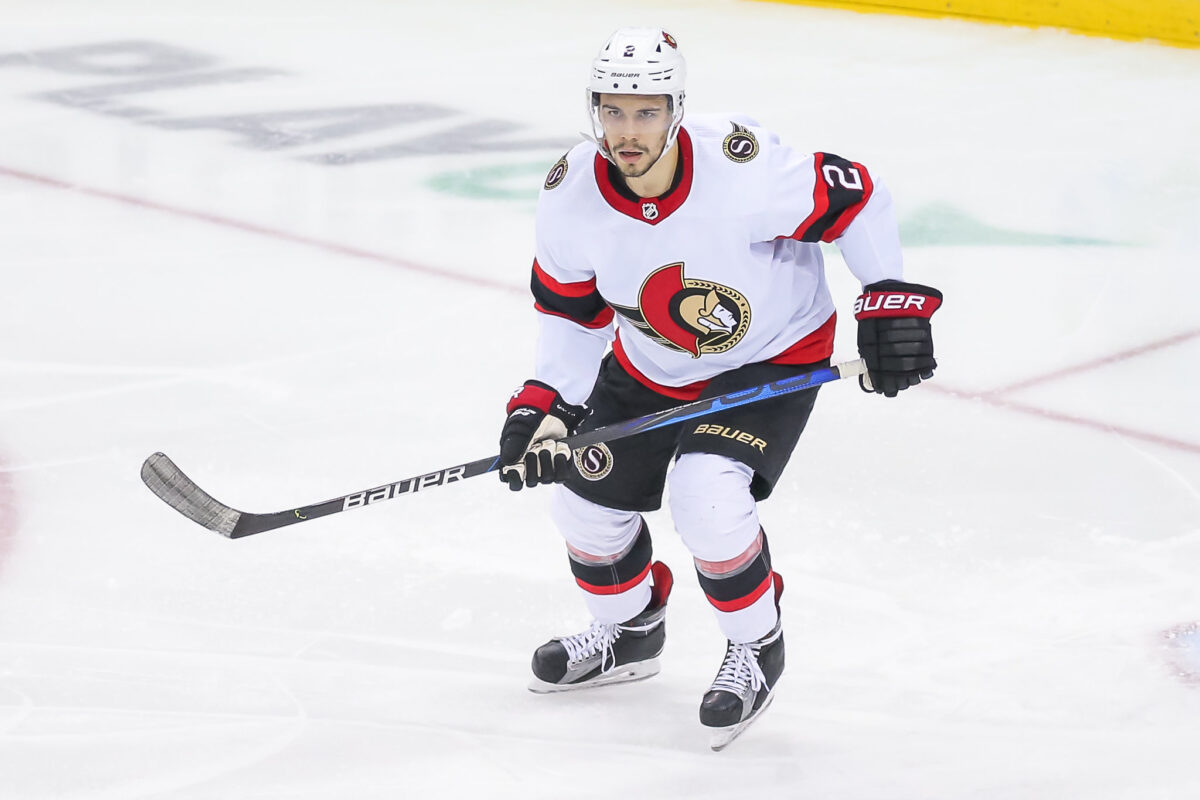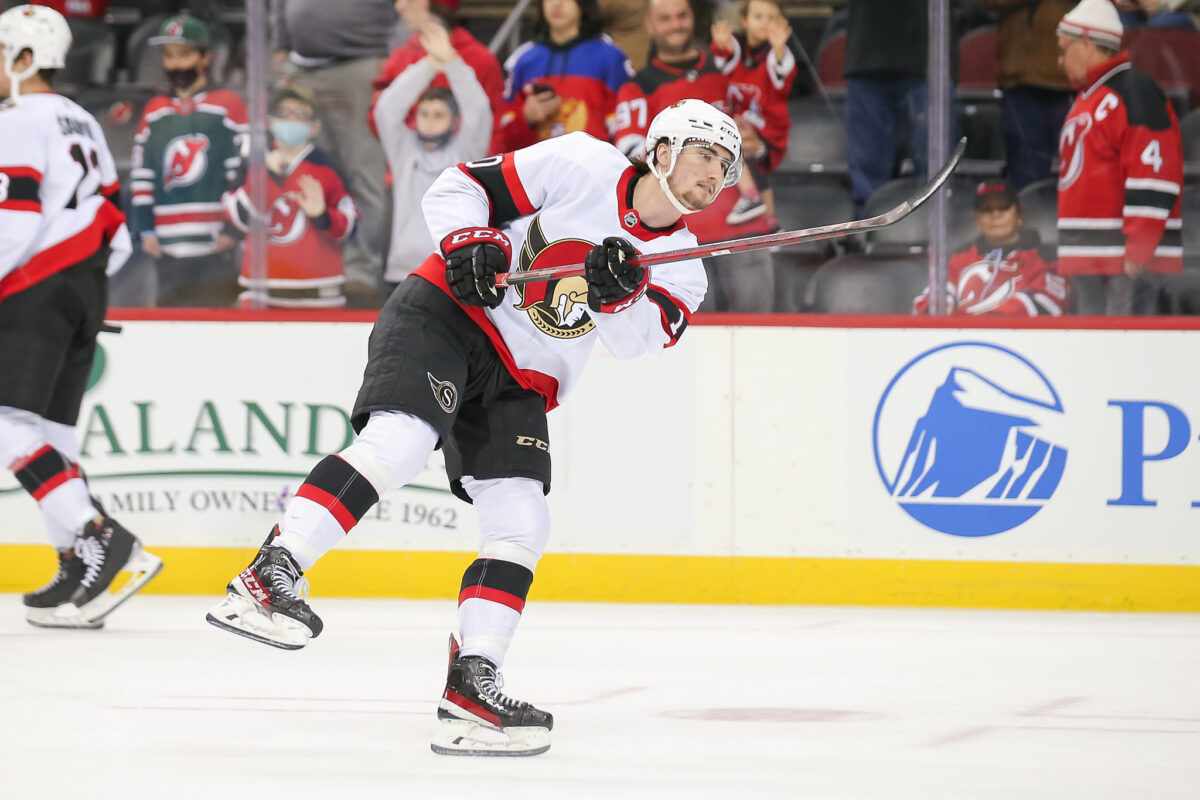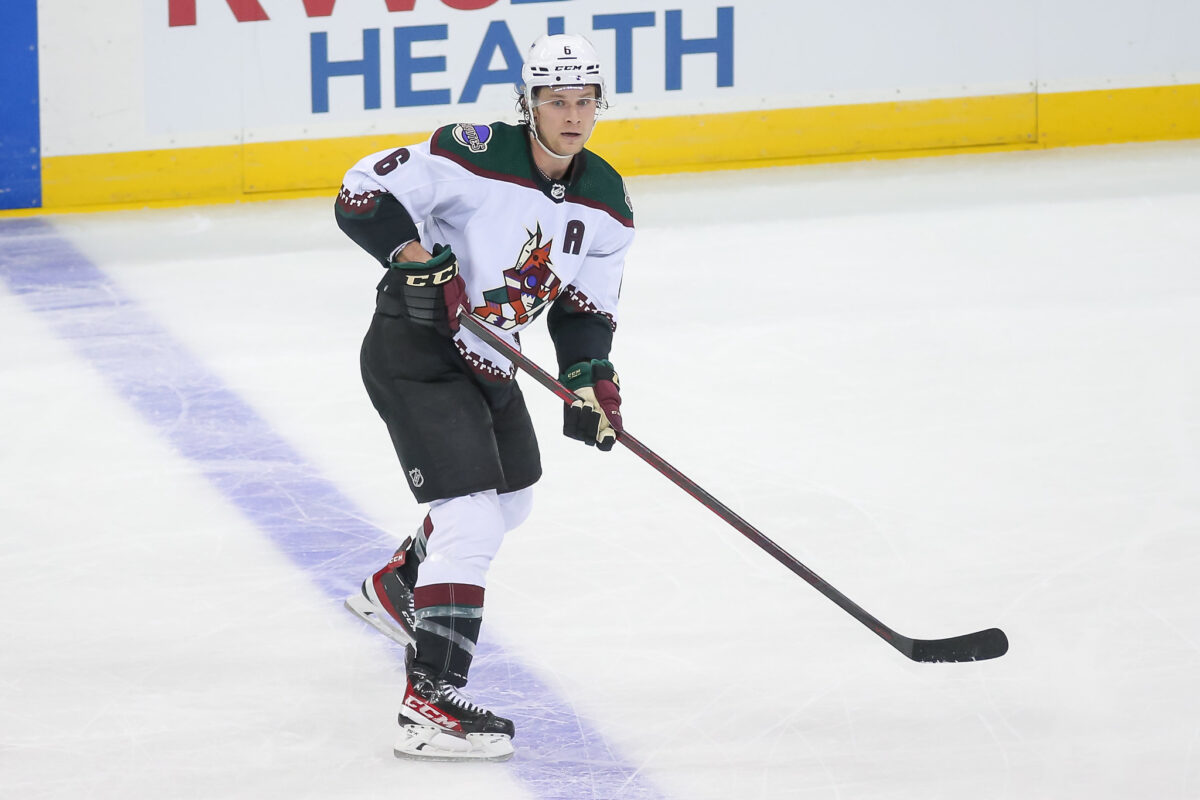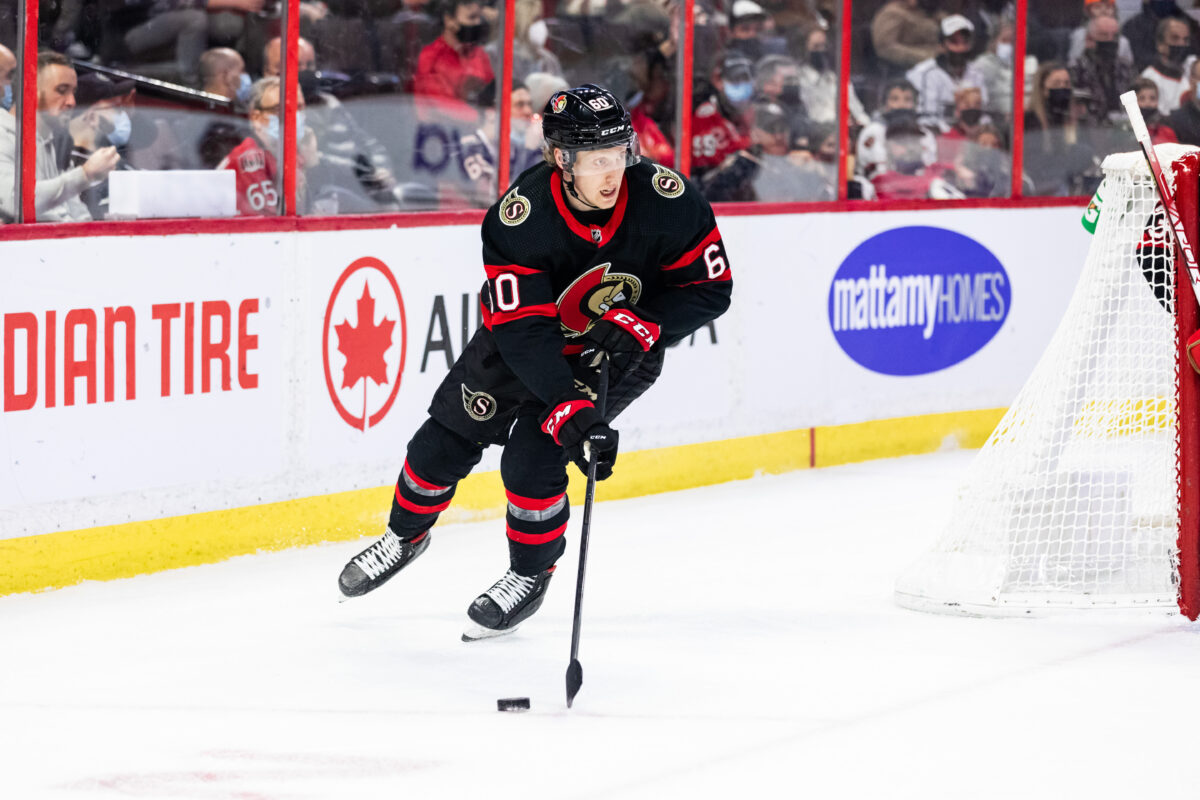Heading into the offseason, the Ottawa Senators had several things they needed to get done. First on the list was signing burgeoning star Josh Norris to a long-term contract, followed closely by shoring up their goaltending and acquiring players to help them win now. Then there were extensions for Tim Stutzle and Artem Zub, two young stars on the cusp of greatness.

With less than a month before the start of the 2022-23 NHL season, nearly everything has been taken care of. Norris signed in July, just after the Senators traded for Alex DeBrincat and Cam Talbot and signed Claude Giroux. Then, early in September, Stutzle signed a massive eight-year, $66.8 million contract, which will make him the team’s highest-paid player in 2023-24. It’s been a stellar offseason for general manager Pierre Dorion and company that has transformed the franchise practically overnight.
However, one item on the team’s original list remains unaccounted for: signing Zub to a long-term deal. Signed out of Russia in 2020 to a reasonable $2.5 million, two-year contract, he’s proven to be worth every penny, giving the Senators a fighting chance every time he steps on the ice. He’s quickly become a fan-favourite, too, thanks to his skill and chant-able name. But with the Senators pursuing a top-four defenceman and needing to make room for several prospects, there may be a reason he hasn’t yet signed an extension – they don’t know how they can keep him around.
Senators Will Have Cap Issues
For years, the Senators were a cap floor team, regularly spending among the least in the NHL, using the excuse that they were a small market team and couldn’t afford to spend up to the cap ceiling. Dorion proved that wrong this year, however, as the team is now just $5.5 million away from the $82.5 million cap limit, and they still have to sign burgeoning forward Alex Formenton. Add in Norris and Stutzle’s extensions, and you suddenly have a team who is not afraid to gamble on potential and pay their stars what they’re worth.
Related: Senators’ Expected Production for 2022-23: Defence & Goaltending
However, next offseason, things are going to be a little tight. As it stands, the Senators are looking at just over $22 million in cap space, with the cap limit set to increase by $1 million. While it could increase drastically after that, according to Bill Daly, Ottawa will need to get past 2023-24 first, and that may prove to be more difficult than anticipated. Firstly, Formenton needs to be re-signed, as he’s emerging into a valuable secondary scorer with speed to burn. He’s shown great chemistry with Drake Batherson and Norris in the minors, and the Senators surely don’t want to break that up.

While Dorion expects Formenton to sign before training camp gets underway, the price tag might be a sticking point. His market value is likely around $3 million, based on other players who have a 30-point season under their belt before they’re 25 years old, like Kailer Yamamoto, Nicholas Roy, Martin Necas, and Pavel Zacha. But Formenton is probably looking at something similar to Joel Farabee, who signed a $5 million, six-year contract after one 38-point season in 2020-21, as well as Lawson Crouse, who inked a $4.3 million, five-year deal a month ago after a 20-goal, 34-point campaign. With all the other commitments they have, the Senators will probably sign Formenton closer to the $3.5 million annual average value (AAV).
Next, the Senators are going to get to work on DeBrincat’s extension, who will be a restricted free agent in 2023-24. Even if he simply repeats his 41-goal, 76-point season from 2021-22 with the Chicago Blackhawks, he’ll be up for a hefty raise on his $6.4 million salary. Players with similar stats have gone on to earn $8 – $9 million on their next contracts, and DeBrincat will be no different, likely signing for no less than $8.25 million AAV. With two players signed, the $22 million space has decreased to just over $10.25 million, with plenty more to do.
Austin Watson, Dylan Gambrell, and Tyler Motte are all free agents after next season, and it’s expected that at least one or two of them will be allowed to walk, especially with some very talented prospects getting close to pushing for a roster spot. Gambrell is the most likely to stick around, as he’s established himself as a reliable defensive forward with the ability to contribute offensively. But the Senators may also choose to keep Watson around as a veteran enforcer, as he’s connected well with the team and community. Together, those two players should be expected to earn about $3 million combined, leaving $7.25 million left to address both the defence and goaltending, which will include replacing Nick Holden, Travis Hamonic, and Cam Talbot. That’s not a lot, especially when adding in Zub’s extension.
Senators Still Looking for a Top-Four Defenceman
It’s no secret that the Senators’ biggest weakness is on defence. The acquisition of Hamonic helped somewhat last season, but things need to change significantly if the team is going to be a playoff contender. Ottawa was reportedly working on a deal to bring in Arizona Coyotes defender Jakob Chychrun, but the price was far too expensive for a team just coming out of a rebuild. Still, after such a successful offseason, it’s somewhat surprising that the Senators’ defence remains unchanged.

While the Senators’ general manager has claimed he’s comfortable with the defence corps as it stands, Dorion certainly won’t wait to make improvements if the right player becomes available. Recent rumours point to Carolina Hurricanes righty Ethan Bear, who is looking to bounce back after a shaky 2021-22 campaign. He would certainly be an upgrade on the right side, but is he actually what the Senators are looking for? A player of Chychrun’s calibre makes a lot more sense, but there aren’t many of those types of players available right now, leaving the team in a bit of a bind.
If they can trade for Bear, his $2.2 million will easily fit under the cap this season, but it’s almost guaranteed he’ll look for a raise next season. Depending on his performance, that will cost Ottawa $2.5 – $4 million, which is still very affordable for a top-four defender but eats up precious cap space. Another defenceman would have to go the other way, and the team has been looking to move Nikita Zaitsev’s ugly $4.5 million cap hit for some time now. He’s still a valuable depth defender, blocking shots and playing physically, but nowhere near the value of his contract. Bear averaged less ice time, but still had similar defensive point shares, higher offensive point shares, and ranked seventh in blocked shots on the Hurricanes.
Moving Zaitsev seems imperative to acquire a top-four defenceman, as he eats up far too much cap to be playing bottom pairing minutes. If they can’t do it this season, they may look to next offseason, where several intriguing defenders are set to hit the market, including Matt Dumba, Damon Severson, Dmitri Orlov, and Travis Sanheim. However, those are, at the very least, $6 million players. While they would transform the Senators’ defence immediately, they also would force out other players beyond just Zaitsev, namely Zub, who also becomes a free agent after next season.
Ottawa’s Prospects Need Spots
A lot of these issues are hypothetical; there is a very real possibility that the team finds a creative way to move salary around, upgrade their defence, and keep Zub. But what to do with all their prospects, many of whom are very close to earning a roster spot, is a real problem.
Jake Sanderson is the Senators’ best prospect not yet in the NHL, but that likely won’t be the case after 2022-23. He’s been heralded as the team’s saviour on defence after a very successful campaign with the University of North Dakota that prompted Ottawa to select him fifth overall in 2020. Not only has he won an NCAA Championship, a World Junior gold medal, and was named an NCAA All-Star, but he’s regularly projected to be one of the best prospects in the NHL according to Mason Black’s PNHLe rankings, which measures a player’s point potential in the NHL. While he won’t hit the 100-point mark like the model projects, he certainly looks like a bona fide superstar defender, and he’ll get a chance to prove that this season.
Jacob Bernard-Docker follows Sanderson as the team’s best defensive defenceman. He was a standout at the University of North Dakota, winning numerous accolades that included the Best Defensive Defenceman in 2020-21. Last season, he spent most of the time with the American Hockey League’s (AHL) Belleville Senators, putting up nine points in 58 games and was second on the team in plus-minus. He also got a chance to play in eight NHL games, where he registered his first point, a primary assist on a Zach Sanford goal. There’s a very real possibility that he’s ready to play this season, but if not, he certainly will be ready by 2023-24.
Following up Bernard-Docker is Lassi Thomson, who also spent most of last season in Belleville. His offensive game is much more developed than Bernard-Docker, as he put up 26 points in 44 games and led the team’s defence with 10 goals. He also managed to play a few NHL games, dressing for 16 contests and recording five assists. However, the defensive side of his game is still a work in progress, and while it has improved, he may still need another season in the AHL before he earns a permanent spot with the Senators.

Already, three prospects are very close to claiming a roster spot, and the Senators will have to make some room for them as early as next season. Hamonic and Holden were always going to be placeholders until the team’s top prospects, especially considering their current contracts. Neither have higher potential than Sanders, Bernard-Docker, or Thomson, as all project to be potential top-four defenders when they reach their prime. But with Zub’s contract also expiring at the same time, he may also be seen as a placeholder. At 26 years old, he’s far from past his prime, but he isn’t likely to improve much beyond what he is now – a 20-30-point defensive defenceman who can play top-four minutes, which is exactly what Bernard-Docker projects to be.
Then there’s Maxence Guenette. A seventh-round pick in 2019, he has developed into a steady two-way defender who can do it all. In his first season in the AHL, he scored 19 points in 48 games, a very impressive total for a rookie defender. He also has some leadership skills, despite his young age. Earlier this month, he was named the Senators’ captain at the 2022-23 Prospects Challenge in Buffalo, with Sanderson and Shane Pinto serving as assistants. Although the team didn’t perform well, he impressed assistant general manager Trent Mann with his ability to guide the younger players. He won’t push for a roster spot for at least another couple of seasons, but he should get a call-up or two this year, and projects to be a decent depth defender with some offensive flair.
Add in Tyler Kleven, Ben Roger, and Tomas Hamara, all of whom will be arriving within the next couple of seasons, and the Senators will need to make some serious decisions on how they want their blue line to look. Not only will there be too many bodies for the number of spots available, but many of those players will be looking for contracts. Sanderson especially will command top dollar in 2024-25, but everyone else mentioned above will also need to be signed before or at the same time.
This, of course, is not a surprise for the Senators. It’s why they selected Tyler Boucher 10th overall in 2021. The team’s scouts knew there were more talented players available, but they knew that they wouldn’t be able to afford them. On the other hand, Boucher is almost guaranteed to make the NHL, but he has little upside beyond a third-line player, meaning he won’t command much of a paycheck and will fit in well with the other physical forwards in the lineup. That means, unless several prospects are traded to win now, it seems like the Senators won’t be able to commit long-term to Zub.
Zub’s Future in Ottawa
While fans have heard plenty about Formenton’s extension, as well as Norris and Tkachuk’s before him, there has been little about Zub. That doesn’t necessarily mean his days are numbered in Ottawa, but based on everything else, it certainly seems to point to it. Zub’s contract extension would likely cost the team upwards of $4 million per season, similar to John Marino or Adam Larsson, two other right-handed defencemen who are close to him in age and play defensively-sound hockey. Unless there are major changes, the Senators simply can’t afford to keep Zub around at that price.
Thankfully, Zub is under contract for one more season, which gives the Senators time to weigh their options. The Senators will be closely watching their prospects to see how well they’ve progressed, as well as Brannstrom, Hamonic, and Holden, judging whether they deserve another contract with the team. Dorion will also be scouring the trade market, looking for a way to both help his team and dump Zaitsev’s contract. Although the 2022-23 season is right around the corner, the Senators are far from finished, and that’s a good thing for Zub.